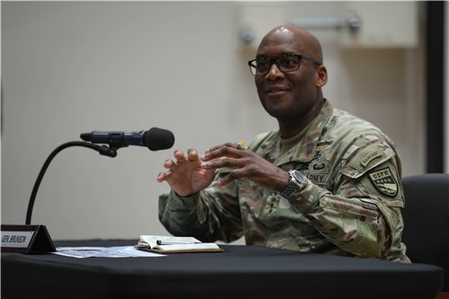

Seoul, Aug 10 (IANS) The commander of the US Forces Korea (USFK) said taking “shortcuts” for the transition of wartime operational control (OPCON) to Seoul from Washington could imperil the readiness posture on the Korean Peninsula.
Gen. Xavier Brunson stressed the need to adhere to bilaterally agreed-upon conditions for the OPCON transfer, as the issue could emerge as a key agenda item related to “alliance modernisation” during the first-ever summit between the South Korean President Lee Jae Myung and US President Donald Trump later this month.
“If we choose to take shortcuts, that could endanger the readiness of the force here on the (Korean) Peninsula,” Brunson told reporters during a South Korean defence press corps visit to the US military base Camp Humphreys in Pyeongtaek, some 60 kilometres south of Seoul, on Friday.
“The conditions were set for particular reasons … and so I think that to rush to do something, just to say that it was done, is not in the best interest of any of our homelands,” he said, adding that any possible change in the plan should be accompanied by conditions to militarily ensure peace on the peninsula.
Seoul and Washington have been working on the “conditions-based” OPCON transfer. Conditions include South Korea’s capabilities to lead combined Korea-US forces, its strike and air defence capabilities, and a regional security environment conducive to such a handover, Yonhap news agency reported.
The OPCON transfer was supposed to occur in 2015 but was postponed, as the allies agreed in 2014 to a conditions-based handover — rather than a timeline-based one — due to Pyongyang’s advancing nuclear and missile threats.
While reaffirming his priority remains on protecting the allies from threats, including North Korea, which he called the “closest alligator to the boat,” Brunson brought up the need for changes to reflect the “markedly different” security environment in Northeast Asia compared with when the alliance was forged 75 years ago.
“We have a nuclear-armed adversary who’s north of the border. Here we have increasing involvement of Russia, along with the DPRK, and we also have the Chinese and the threat that they pose to a free and open Indo-Pacific,” the commander said. DPRK is the acronym of the North’s formal name.
“I think alliance modernisation is something that ensures that our alliance remains ready, that we remain relevant, and that we remain able to best deal with any of the evolving security challenges that might pose us, together,” he said, when asked about his understanding of the concept.
On a similar note, a Pentagon official on Friday noted that efforts by the allies to modernise their alliance include expanding cooperation to ensure credible deterrence on the Korean Peninsula and “beyond,” while underlining its “primary” focus on deterring North Korean threats.
Against such a backdrop, the USFK commander said he believes changes should occur within the 28,500-strong force. He still declined to discuss such changes in terms of numbers when asked about speculation over a possible reduction in the force for “strategic flexibility.”
“I think that the conversation ought not be about numbers. It ought to be about capabilities,” Brunson said.
“Moving those capabilities around might offer great protection. Using the things that we do have in different ways might offer better protection,” he said.
Brunson cited as an example how Patriot batteries have been temporarily moved to the Middle East for strategic flexibility but will be returning here for the newest equipment upgrades.
On the Korean side, the USFK commander noted that South Korea should be equipped with stronger capabilities to cope with North Korea.
“What’s being asked of Korea is to be stronger against DPRK, that we might have the flexibility as we modernise our alliance so that we could go do other things,” he said, while stressing that each government will make decisions based on its own national interests.
In the midst of the security challenges and potentially ensuing changes awaiting the allies, Brunson voiced confidence in the power of the 75-year alliance, calling it the “envy of the world” that can fend off any threat.
“Our asymmetric advantage is our alliance. That counters anything that the DPRK has. That counters anything that China has. It counters anything that Russia has. It’s being in alliance.”
–IANS
int/bpd/sd
